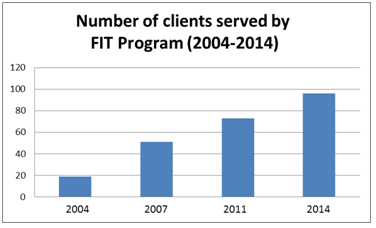Editor’s note: Below is a guest blog post from Grantee Partner Doorways for Women and Families.
When Susan left her abusive husband and entered our Safehouse, she had had no control over her finances for years. Her immediate safety had always been her main concern, so her financial circumstances were a lower priority. But we knew that for Susan to successfully leave this relationship, we had to make her financial security a priority as well.
At Doorways for Women and Families, we know that financial stability is critical to the long-term safety and independence of survivors of domestic violence. Having an independent income, an understanding of debt and savings and knowledge of money management can make the difference between a survivor maintaining his/her safety or returning to their abuser. That is why in 2005, we created our Financial Independence Track (FIT), a program that helps clients develop financial literacy and skills.
After suffering years of abuse and control, many of our clients are unfamiliar with how to manage their finances. Financial abuse can also leave our clients with major debts from $2,000-$60,000, while their incomes often only range from $6,000-$24,000. These issues are compounded by feelings of low self-esteem, depression and fear leading to severe deficits in their sense of empowerment over their finances.
When Susan met her financial counselor, she pulled her credit report and discovered that her husband had run up her credit card with $6,000 in student loan debt. Susan’s only source of income was her Social Security Disability Insurance, but her FIT counselor shared that she might be eligible for debt forgiveness through the U.S. Department of Education’s Total Permanent Disability Discharge Program. Within four weeks of submitting the application, Susan’s case was sent to their office for review and her debt relieved. As Susan began to see some light at the end of the tunnel, she continued to work with our FIT program and saved $2,257 to help her secure her own apartment.
Our FIT program takes a multifaceted approach to address the financial challenges of Doorways’ clients, ensure we fully understand a client’s personal financial situation and find the best resources and solutions available. Through regular one-on-one sessions, FIT counselors help by:
- Meeting clients were they are financially to build tailored financial plans;

- Improving clients’ understanding of basic money management through creation of a monthly budget and education on the importance of credit reports/scores;
- Helping clients understand strategies to reduce debt;
- Aiding clients in understanding their rights, how to communicate with collectors and address debt which may inhibit them from living independently;
- Creating separate bank accounts for our clients, ending their association with their abuser’s finances; and
- Helping clients to live self-sufficiently and independently.
Unfortunately, Susan’s story is not unique. Far too many women are on the verge of returning to abusive situations because they lack the financial stability on their own, but support from organizations like Washington Area Women’s Foundation ensures these stories end with a brighter future. Over the years, we have seen tremendous success from our FIT model, and we continue to grow our program by partnering with area businesses, community groups and individual community members to help create pathways to employment and financial success and security for our clients.
To learn more about FIT, and how you can help reach more survivors of domestic violence and families experiencing homelessness, visit: www.doorwaysva.org.
Doorways has been a Washington Area Women’s Foundation Grantee Partner since 2007.

